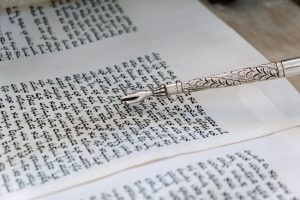
(See Drashos Beis Halevi, Shu”t 3:18)
After the utterance of the Aseres Hadivros, Hashem taught Moshe Rebbenu the entire Torah over a period of forty days and nights. He acquired the luchos (tablets of stone), which were the miraculous work of Hashem.
However, after they made the Eigel Hazahav (Golden Calf), the letters flew off the luchos; the tablets were too heavy for Moshe, and they fell and broke (this will be explained later). Moshe pleaded with Hashem that Klal Yisrael should be forgiven, and eventually Moshe was able to make another set of luchos himself.
Hashem told Moshe that He would make a covenant of Torah with Yisrael (see further).
The Miraculous Tablets Made by Hashem
The Rabbis tells us that all the texts were taught to Moshe on Mount Sinai. Originally, they were contained within the luchos — miraculously, by gazing at the tablets, one could understand the written Torah and all the Rabbinic texts without effort, in written form.
However, after breaking the luchos, Moshe had to replace them. These second, man-made luchos, did not have the power to convey the entire Torah. Now, there would be two distinct aspects of Torah. The books of prophecy would be in written form (represented by the luchos), but the Talmudic explanations would be in oral form only.
There is no longer a miraculous device which conveys understanding of Torah like the first luchos. To study the written works would be relatively easy (from a text), but to understand the oral explanations (the Torah She’ba’al Peh of Talmud and Medrash, etc.) would take effort and sacrifice.
The Written Torah Versus the Oral Torah
The reason for this new division is as follows: If it weren’t for the cheit of the Eigel, no nation would have the power to rule over them. However, now that the sin had been committed, it was decreed they would eventually have to go into exile. Now it was necessary to establish the Bris Hatorah, so that Yisrael would not be lost among the nations.
If the Torah would be written in its entirety, in exile, the nations would get it as well and the uniqueness of Klal Yisrael would be lost. Therefore, only a small portion of the Torah would be written (which the nations, would, indeed, have translated). The bulk would have to be given orally from teacher to student in a difficult format, and would remain uniquely Jewish.
The Covenant of Torah
The Torah says that the Bris Hatorah is the Torah Sh’ba’al Peh (the oral traditions). This was said after the Cheit Ha’eigel; as well, a prohibition of writing Torah Sh’ba’al Peh was said at that time (Rashi, Shmos 34:27).
Breaking The Luchos
As stated above, the letters flew off the first tablets. They were heavy, and Moshe dropped them. It was the Torah Sh’ba’al Peh which flew away! This is why the luchos were too heavy — it’s impossible to have the Torah bichsav without the Torah Sh’ba’al Peh. (For example, we wouldn’t know how to make tefillin or tzitzis, or which fruit to use with the arba’ah minim!)
The Torah Sh’ba’al Peh wasn’t written on the luchos when he broke them — the letters had already flown away. All that remained were the words of the Torah bichsav. Therefore he was told to “write these words” again — that is, the words which remained on the luchos when they were broken — referring to the written part. This time, the Torah Sh’ba’al Peh would be given ba’al peh (orally) alone. Now there are two parts — the written (relatively simple) part, and the oral — the difficult part.
Now the Torah Sh’ba’al Peh would take effort and hard work, unlike the case with the first luchos, where everything was in written form, perceived miraculously by gazing at the text.
Medrash Tanchuma, Parshas Noach, describes how Klal Yisrael were forced into accepting the Torah. This refers to the Torah Sh’ba’al Peh which takes much toil and effort (Ibid.). Rav Dovid Cohen explained that according to the Beis Halevi, this could only refer to the second luchos. Everything would be very simple if they hadn’t sinned with the Eigel Hazahav and they would have merited the miraculous tablets made by Hashem. But now that the first tablets were gone, they would have to exert themselves greatly to understand the difficult Torah Sh’ba’al Peh…


